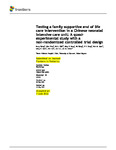Testing a family supportive end of life care intervention in a Chinese neonatal intensive care unit: A quasi- experimental study with a non-randomized controlled trial design

Date
2022-07-22Author
Subject
Metadata
Show full item recordAbstract
<jats:sec><jats:title>Background:</jats:title><jats:p>Neonatal death often occurs in tertiary Neonatal Intensive Care Units (NICUs). In China, end-of-life-care (EOLC) does not always involve parents.</jats:p></jats:sec><jats:sec><jats:title>Aim</jats:title><jats:p>The aim of this study is to evaluate a parent support intervention to integrate parents at the end of life of their infant in the NICU.</jats:p></jats:sec><jats:sec><jats:title>Methods</jats:title><jats:p>A quasi-experimental study using a non-randomized clinical trial design was conducted between May 2020 and September 2021. Participants were infants in an EOLC pathway in the NICU and their parents. Parents were allocated into a family supportive EOLC intervention group or a standard EOLC group based on their wishes. The primary outcomes depression (Edinburgh Postnatal Depression Scale for mothers; Hamilton Depression rating scale for fathers) and Satisfaction with Care were measured 1 week after infants' death. Student <jats:italic>t</jats:italic>-test for continuous variables and the Chi-square test categorical variables were used in the statistical analysis.</jats:p></jats:sec><jats:sec><jats:title>Results</jats:title><jats:p>In the study period, 62 infants died and 45 infants and 90 parents were enrolled; intervention group 20 infants, standard EOLC group 25 infants. The most common causes of death in both groups were congenital abnormalities (<jats:italic>n</jats:italic> = 20, 44%). Mean gestational age of infants between the family supportive EOLC group and standard EOLC group was 31.45 vs. 33.8 weeks (<jats:italic>p</jats:italic> = 0.234). Parents between both groups did not differ in terms of age, delivery of infant, and economic status. In the family support group, higher education levels were observed among mother (<jats:italic>p</jats:italic> = 0.026) and fathers (<jats:italic>p</jats:italic> = 0.020). Both mothers and fathers in the family supportive EOLC group had less depression compared to the standard EOLC groups; mothers (mean 6.90 vs. 7.56; <jats:italic>p</jats:italic> = 0.017) and fathers (mean 20.7 vs. 23.1; <jats:italic>p</jats:italic> &lt; 0.001). Parents reported higher satisfaction in the family supportive EOLC group (mean 88.9 vs. 86.6; <jats:italic>p</jats:italic> &lt; 0.001).</jats:p></jats:sec><jats:sec><jats:title>Conclusions</jats:title><jats:p>Supporting parents in EOLC in Chinese NICUs might decreased their depression and increase satisfaction after the death of their infant. Future research needs to focus on long-term effects and expand on larger populations with different cultural backgrounds.</jats:p></jats:sec><jats:sec><jats:title>Clinical Trial Registration</jats:title><jats:p><jats:ext-link>www.ClinicalTrials.gov</jats:ext-link>, identifier: NCT05270915.</jats:p></jats:sec>
Collections
Publisher
Place of Publication
Journal
Volume
Pagination
Number
Recommended, similar items
The following license files are associated with this item:

